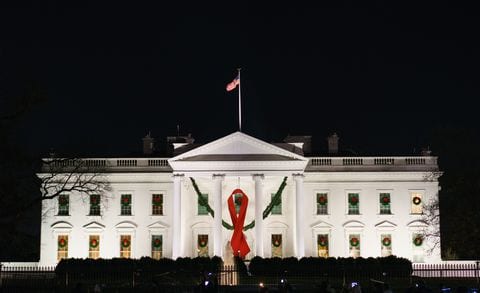
The remaining members of the Presidential Advisory Council on HIV/AIDS were fired en masse this week.
Months after a half-dozen members resigned in protest of the Trump administration’s position on health policies, the White House dismissed the rest through a form letter.
The notice “thanked me for my past service and said that my appointment was terminated, effective immediately,” said Patrick Sullivan, an epidemiologist at Emory University who works on HIV testing programs. He was appointed to a four-year term in May 2016.
The council, known by the acronym PACHA, has advised the White House on HIV/AIDS policies since its founding in 1995. Members, who are not paid, offer recommendations on the National HIV/AIDS Strategy, a five-year plan responding to the epidemic.
The group is designed to include “doctors, members of industry, members of the community and, very importantly, people living with HIV,” said Scott Schoettes, a lawyer with the LGBT rights organization Lambda Legal. “Without it, you lose the community voice in policymaking.”
Schoettes was among those who quit in June, and he went out with a fiery commentary in Newsweek. “The Trump Administration has no strategy to address the on-going HIV/AIDS epidemic, seeks zero input from experts to formulate HIV policy, and — most concerning — pushes legislation that will harm people living with HIV and halt or reverse important gains made in the fight against this disease,” he wrote in the column.
“We tried to stick it out,” Schoettes told The Washington Post on Friday. “The fact is you’re dealing with a public health issue. It’s not partisan at all.”
But the “writing was on the wall,” he continued. The Office of National AIDS Policy, established in 1993 during the Clinton administration, has not had a director since Donald Trump took office. “The tipping point for me was the president’s approach to the Affordable Care Act,” Schoettes said. “It is of great importance for people living with HIV like myself.”
The council’s executive director, Kaye Hayes, confirmed in a statement that all remaining 10 council members had received letters Wednesday “informing them that the administration was terminating their appointments.”
She did not address when the administration might begin to make new appointments to the council, which can number up to 25 members. Its most recent meeting took place in August, Sullivan said, and by November, an archived version of PACHA’s website shows the group was down to 10 members and two staffers.
The website, which says it was updated Thursday, showed two staffers and no council members Friday.
“Changing the makeup of federal advisory committee members is a common occurrence during administration changes,” Hayes said in the statement. “The Obama administration dismissed the George W. Bush administration appointees to PACHA in order to bring in new voices. All PACHA members are eligible to apply to serve on the new council that will be convened in 2018.”
The Washington Blade reported that termination letters were delivered without warning by way of FedEx. Gabriel Maldonado, chief executive of the LGBT and HIV/AIDS group TruEvolution and a council member until this week, said he could only speculate why the final members were fired.
“Like any administration, they want their own people there,” Maldonado, an Obama appointee, told the Blade.
But Sullivan and Schoettes said that previous administrations had allowed members to serve full terms before appointing replacements. “It is important to have a rolling, transitioning body that crosses administrations that really has a set of diverse outlooks on the epidemic,” Sullivan said.
In September, President Trump issued an executive order that continued PACHA and 31 other advisory bodies through fall 2019. A call for new council-member nominations went out via a Dec. 1 notice posted on the Federal Register. The nomination period closes Tuesday.
Sullivan said he hoped that new members will “continue to engage around the issues that the previous PACHA brought up.” Schoettes is not optimistic that the notice will attract qualified people.
“The only criteria for serving this president is loyalty,” he said. “From the [Centers for Disease Control and Prevention] to this body, to the FBI, there is a real problem this president has with dialogue or dissent.”
Read more:
More African Americans still die of HIV than whites and Latinos combined, the CDC says
Trump calls House health bill that he celebrated in the Rose Garden ‘mean’